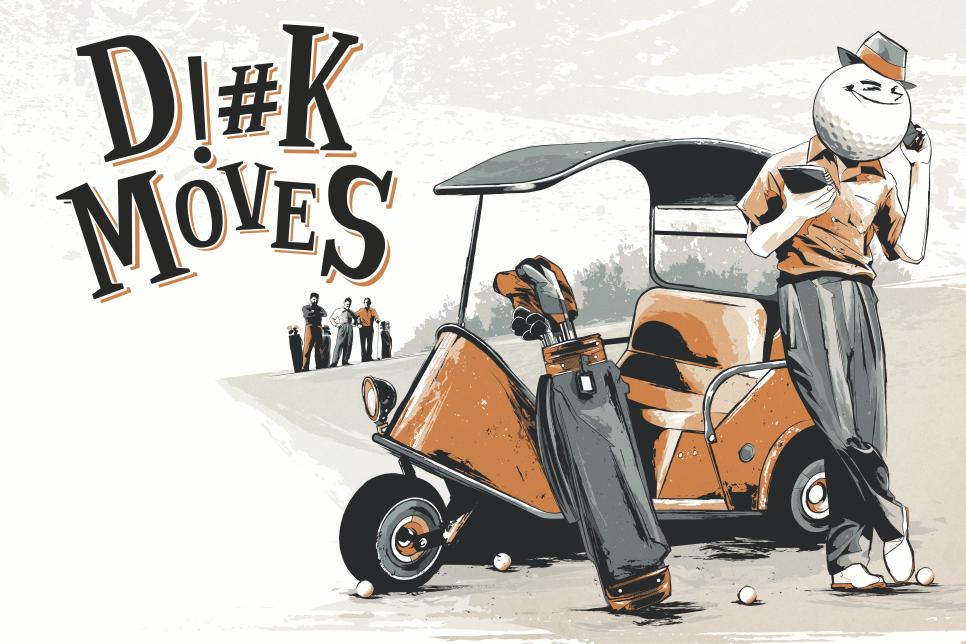
Forgive the low language, but there’s really no other way to describe them. As golfers, you know one when you see one. Sometimes bigger but mostly small, these are the actions that reveal a crack where you can peek into a person’s true soul. They are committed by all genders, and if the cast of Seinfeld were all golfers, the following could inspire 26 episodes. To protect the guilty as well as themselves, the members of our editorial staff have forgone bylines.
Slow Exit
We’re all for the post-round handshake or bro hug. Once done with that, though, get out of the way. Other people are ready to play to the green, and what they don’t need is you fumbling for your phone, keys and wallet, or putting away your tees, ball markers and balls, or wrestling your headcovers on like you’re battling an alligator, followed by sitting in your cart recording the final tallies—all while situated just off the green. Rest assured, the people behind you are muttering under their breath what kind of golfer you are.
The Petty Complaint
“Ask anyone who has ever played golf: When you are three feet or less from the hole and near someone’s line, you don’t mark the ball with a quarter. You mark it with a nonreflective penny.” I once heard a major champion say this after stumbling in with a 75, complaining about his less-accomplished competitor. Friend, if you’re shooting 75 or 85 or 105, and you’re blaming somebody else’s ball mark, the only thing in this scenario that’s nonreflective might be you. Play better.
Leaving Guests Dry
We had just finished a fantastic summer Friday-afternoon round at a top private course. Our host and my two fellow guests had all played well, enjoying a close match. A 19th-hole drink would have been customary, though I have no issue when people must scoot for family, work or other obligations. Having just walked in 90-degree weather, I was parched, and I’ll admit I was as or more eager for the actual liquid refreshment than the social cheer of sitting with fine company. That’s when our host said, bags slung on our shoulders at the foot of the parking lot, “Have a nice weekend, boys. I’m going to go practice my putting.”
I hit terrible traffic going home, as the other guests would have, thirsty the whole way.
SPOILING AN ACE
I went on a first date at my local par-3 course years ago. We got to the first hole, and he said something about it being a serious match. I laughed, thinking it was a joke. We teed off and both hit the green. I two-putted, and he three-putted. I could sense some tension but thought nothing of it. Who wouldn’t be mad after a three-putt? His next tee shot was short, and mine looked like it hit the back of the green. I didn’t see my ball when I got to the green, so I assumed it rolled off the back. As I searched the rough, he called my name. With a stunned look on his face, he pointed to the hole. No way. I walked up to find my ball at the bottom of the cup. He didn’t congratulate me or even seem happy for me. I felt so awkward I didn’t even celebrate my first—and only—hole-in-one. He had a quiet intensity the rest of the round. After nine, he announced our scores—which I didn’t know he was keeping. I had won, and he was clearly unhappy. “Did you take it easy on him?” the ranger joked as he drove by. My date didn’t even give him a courtesy laugh. It goes without saying there was no second date.
Loving A Forfeit
A season-long match-play tournament might be the most rigorous of any competition to win if only because of the scheduling gymnastics: Someone has to work, someone’s picking up his kid at camp, someone has been putting off her colonoscopy for months. In a singles tournament a few years ago, my buddy had locked into an early Saturday-morning match against a high-handicap member he had never met. Texts were exchanged, and a tee time was secured. The hard part was over. The night before, my buddy had a date night with his wife and ordered a clam dish that, well, if ever anyone wanted a mulligan. From his knees that night, a few belt loops tighter than he was at dinner, he at least had the forethought to text his opponent. “Food poisoning hit me hard. Can we reschedule?” The response was immediate: “Actually, I’ll take the forfeit.” Not, Sorry to hear it. Not, Make sure to hydrate.This was warfare, with shop credit at stake. My buddy slinked back into bed. He has refused to enter the tournament since.
Golf Hogging on a Honeymoon
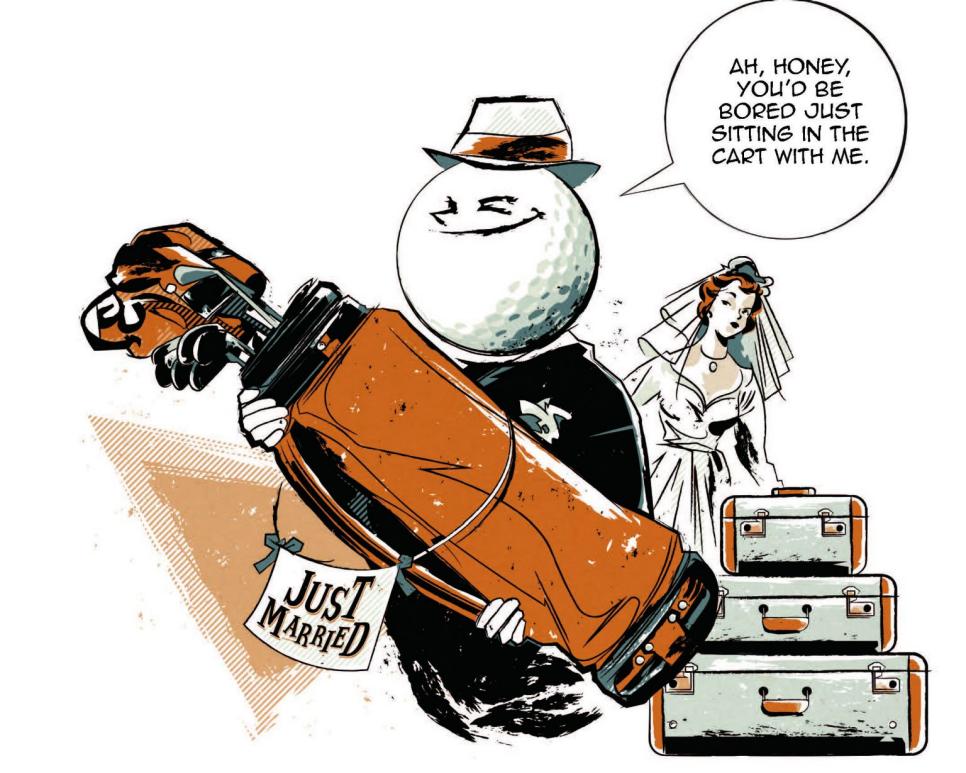
Yes, the honeymoon was in the relative vicinity of one of the great venues of golf-course architecture, soaring vistas stretching to the blue waters of the sea from every angle, holes naturally melting into the landscape in a cavalcade of colors not likely encountered in any national park, an afternoon ahead filled with glorious painted-on clouds and gentle breezes drifting into a Monet sketchbook sunset that would spark even the coldest heart to quote Jane Austen, let alone two lovers on a trip of a lifetime. “Ah, honey, you’d be bored just sitting in the cart with me,” he said as he shouldered his bag and closed the hotel suite’s door behind him.
Mid-Air Confidence
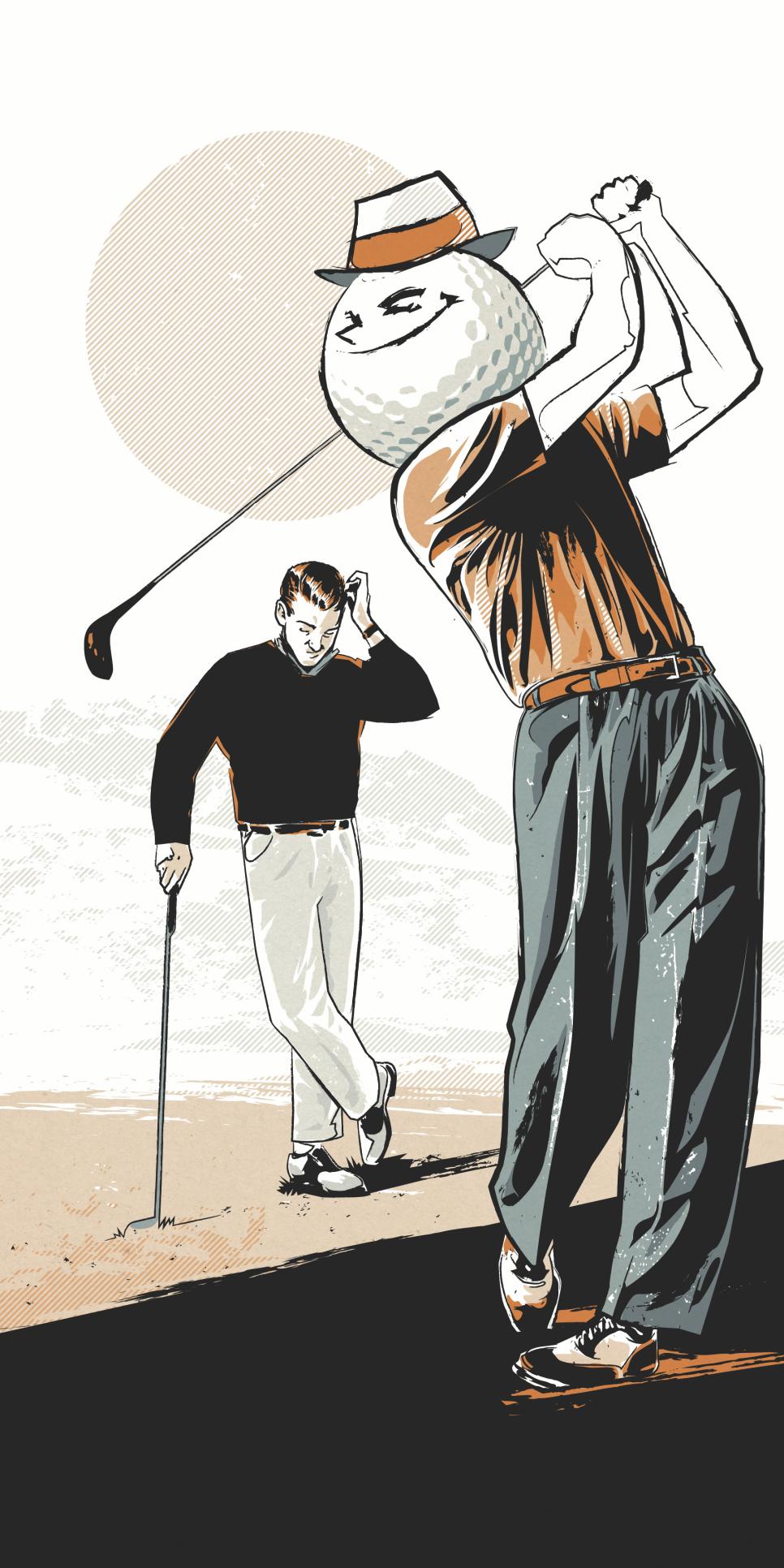
Most of us tend to root for each other. “Nice shot,” or “Stretch!” or “Hang on!” and similar encouraging remarks are usually received welcomingly from the golfer striking the shot. Sometimes, though, you’ll hear a version of “Don’t talk to my ball,” and even the stern reinforcement, “Seriously, don’t talk to my ball.” Once upon a time on a golf course far, far away, a man flushed an iron shot. His playing companion urged this approach to “Be the right distance!” The reply was quick: “Don’t worry, it is.” No one was worried, pal, but karma is a you-know-what. The ball airmailed the green into the deep stuff. When you can’t even accept encouragement properly, that’s jackassery of a high order.
Scent of a Liar
An “unsanctioned” round is a round you don’t want anyone outside of your golf friends to know about. These are the rounds where a perfect shot on a par 3 heading toward the flag is met with “Don’t go in!” Rounds during real work hours require sunscreen, showering with the same products as at home, work clothes put back on and laundry slid into the hamper over the weekend (laundered into the laundry, if you will), and all of this must be done with precision. One Friday afternoon, as I strolled in smelling vaguely of Kiehl’s body wash and wearing the same clothes I wore when I left that morning, my wife asked, “How was work?” I confidently began my spiel; all the while my golf glove was dangling just so from the back pocket of my “casual Friday” khakis. She let me go on for a while before calling me out for being the horrible golf thief that I am.
Marking Decks
An old tradition at some clubs is to draw cards from a deck at the turn, and low card buys the drinks. Members at one club noticed a few of its old-timers seemed to have remarkable luck in never drawing a bad card. This little marvel went on for years until one member had had enough. While examining the deck, he discovered barely visible pencil marks on the back side of some of the picture cards. The deck was corrupt, and the offenders busted.
Turning A Friendly Match Cutthroat
For nearly a week my golf trip to Ireland with a close friend had been everything we could have hoped: a half-empty Aer Lingus flight to Shannon Airport; white-knuckle car rides on the left side of narrow, winding roads; pints of Guinness post-round; nights at an old-world bed and breakfast; and golf on some of the most beautiful links in the world. My buddy and I had played a weeklong casual match. Remarkably, we were all square as we began the week’s final round on the most spectacular weather day of the trip. Early on my friend missed a short putt to win the hole and had barely 15 inches for the half, a length we had given each other all week. Before I could concede, he raked it away, and in a moment of competitive pettiness, I said, “I didn’t give you that.” We carped a bit on the walk to the next tee. Then, hard feelings kept us from speaking again until the 17th green, when, sensing the end of our Irish adventure, I took in the panoramic views of the Atlantic Ocean, snapped to my senses and apologized. We laughed at the ridiculousness of the whole thing as we soaked in one last hole.
Misleading The Wife
For the first decade of a marriage a husband had his nongolfing wife convinced that golf was an eight-hour game, plus an hour or two here and there for drinks and social time with the fellas. Inevitably, the wife heard from a friend that her “Jim comes home after four hours” and confronted the husband. The deceitful d!#k didn’t miss a beat in his reply: “Right, Jim only plays half-rounds—ya know, 18 holes.”
The Oblivious Tourist
A colleague and I played Carnoustie and were paired with a father-son tandem from California that we didn’t know. We each had caddies—my colleague had a veteran, and mine was a guy in his late teens. The round was what you might hope for in Scotland—a mixture of sun, wind and rain, and an exhilarating walk around a legendary course—except the California tandem was what you would expect from “Angry Americans.” They complained the entire round about the changing weather, the reads their caddies made, the wind, the yardages—everything. When we finished, the veteran caddie waited until the California guys walked away grumbling, then asked us if we had time for a drink. We went across the street to the Carnoustie “clubhouse,” and as we entered, we saw the veteran caddie looking at us from over the bar in the form of an oil painting. Turns out he was the club captain and had been a rules official at the previous Masters. We drank many pints, heard many stories and laughed about what our California pair missed out on.
Caddieing With Contempt
We had a caddie at my childhood course who had zero tolerance for taking more steps than absolutely necessary. This came to a boil whenever one of his players topped a drive on a hole where he was forecaddieing to spot balls. That angry walk back, those negative steps, was the ultimate insult to him. So this was the drill: If he had to go back for you one time, for the rest of the round on any forecaddie hole, he’d give you your driver and your 5-iron, just in case you needed more than one shot to reach him.
Unnecessary Putting
In a four-ball match, Team A makes a 4. Team B has one player with a putt to tie the hole, and another player lies 4 on his partner’s line. This ball is dead; it has no meaning in the match whatsoever, so putting it would be like making another move after checkmate in chess. There is no need to concede the putt because it no longer matters, yet often the player will try to putt it to show the teammate the line or for a “score.” Sometimes the teammate will claim the player can putt it if he or she wishes. This exposes a fundamental misunderstanding of the game you are playing. Your hole is over at this point—another putt is nothing but a d!#k move.
The Unthinking Host
We were playing one of those great old courses that has the unfortunate history of taking a while to allow women to join. I was the only woman in our group. We had a fun day, and afterward everyone went to the locker rooms to freshen up before grabbing drinks. When I came out of the women’s locker room, no one from my group was to be found. I poked around, not sure where I was allowed to go without my host. An uneasiness comes with being a guest at a new club; you don’t want to make any accidental missteps. That feeling only grows as a lone female at a club that hasn’t always allowed women. It feels like whatever you do will reflect on all women, not just you. That was a lot of pressure to carry as I wandered alone, unsure of where to go or what to do. Eventually I ended up on an outdoor patio. It had a bar, and it was a beautiful day, so don’t feel too bad for me, but when the rest of my group came out after taking a tour of the men’s locker room and enjoying the bar in there, I can’t say I was impressed.
Fooling A Fool
It’s a dogleg-right par 4 to a blind green, drivable when the tees are up and the wind is at your back, as both happened to be on the day in question. The loudmouth of the club—the guy with the bright-orange sports car who gets a $200 haircut every three weeks—steps up and blasts a honey over the corner—not that he bothered to check if the green was clear of the two walking teenagers ahead. Loudmouth drives up and, lo and behold, finds his ball in the cup. News of the magnificent ace circulates like wildfire. A congratulatory email is sent from the club manager to the membership. By the time Loudmouth stops holding court in the bar and the tender closes for the night, the tab has eclipsed $6,000. Although too young to take part in the celebration, the teenagers sense the event’s escalating enormity. The next day, everyone at the club is still talking about it. Guilt sets in. One teenager tells his father that the ball had, in fact, kicked into the stream by the green—after nearly hitting them—and that he retrieved the ball and placed it in the cup. The father is not happy. After some pained consideration (though one wonders if not with a modicum of glee) the father phones Loudmouth with the truth and offers to split the bar tab, but the man is too broken to respond just yet.
Pin-In Guy
When you play tournament golf, you see everything: the slow player, the nonstop talker, the guy who can’t believe how bad he’s playing (“You should have seen me yesterday!”). A new variety that has been recently created is the pin-in guy. This is the guy who must have the pin in no matter what, resulting in the flagstick going in, out, in, out on every hole, even when the idea of making the cut is a distant memory. We’ll gladly grant exemptions to tour players who are playing for their living and history, but to all others, get over yourself.
The Faux Tip
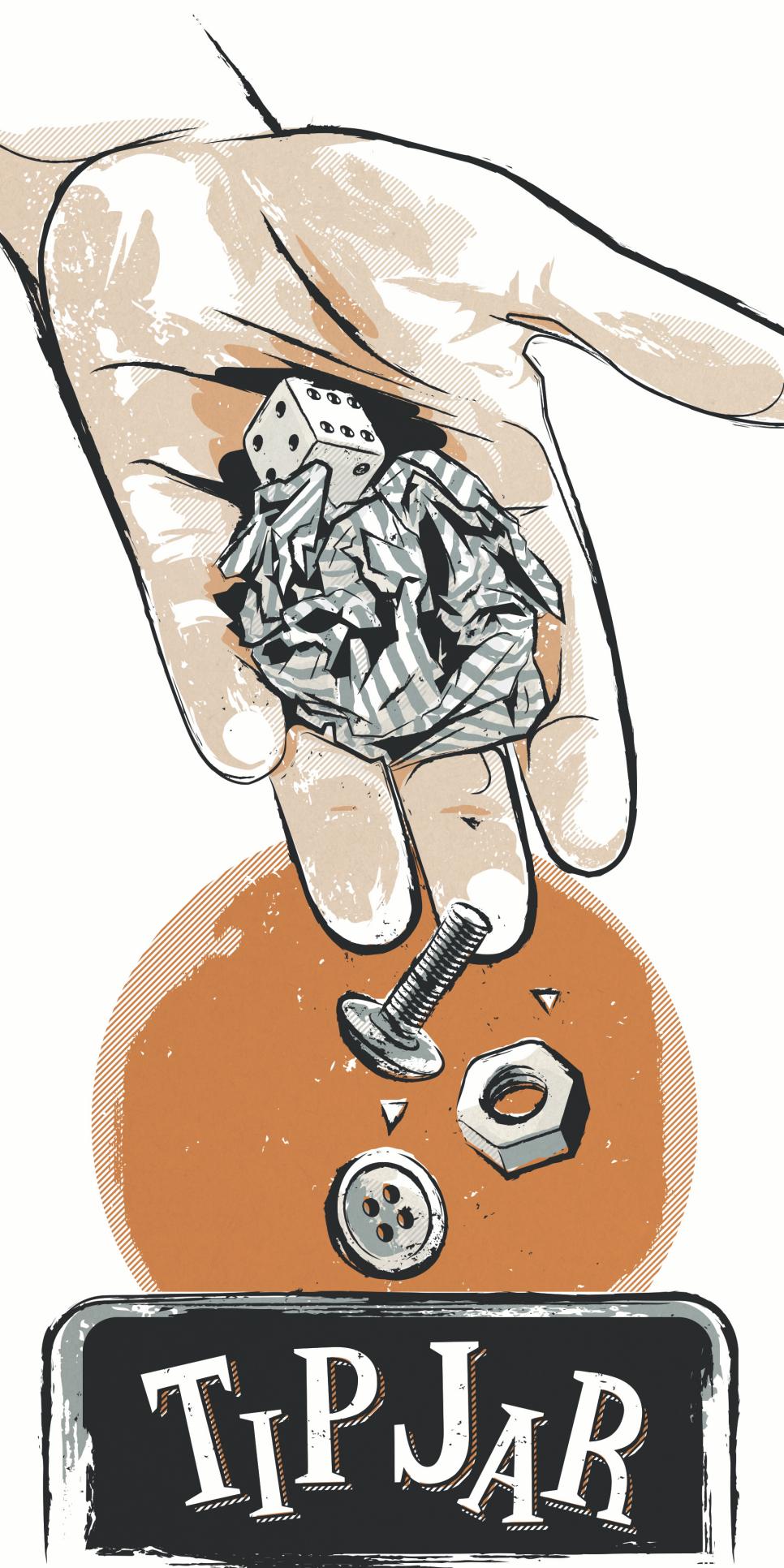
I once saw a former member at our club, who happened to be a man of significant financial means, pretend to drop a few bucks into the bag-room staff ’s tip jug. This is how it went: Waiting just long enough for the young men to become distracted when they started clearing out his cart, the individual stuck an empty clenched hand deep into the container, the walls of the jug hiding the fact he was going in empty. Clearly, it’s bad to stiff the good folks who scrub your dirt-caked clubs clean. Sometimes you don’t have a fiver handy, and then there’s nothing wrong with telling the staff you’ll get them next time. But faking a tip is next-level. Even if the staff didn’t realize it, I did. Losing your integrity for just a few dollars is a big price.
A Better Offer
Fresh out of college (not that that’s an excuse for not knowing better) my former teammate invited me to play at the course where he grew up, with his father. I was excited to see his “ancestral grounds” and had that Saturday morning circled on my calendar for weeks. Two days before, I got invited to play Pine Valley Golf Club. Yes, then (as now) ranked No. 1 among Golf Digest America’s 100 Greatest Courses. I had always figured my chances were greater of getting hit by a bus. I phoned my friend to tell him the incredible news. Despite being a fellow golf geek, he was not as bowled over as I expected. “So you’re not going to play with me and my dad?” I played Pine Valley and felt bad. My friend is a good soul with a high capacity to forgive, and we’re still tight, but ever since I’ve held firm to the sacred covenant that a tee time is never to be broken, certainly not for a better offer.
The Kick-in Head Fake
Two high school players are hitting blind wedge shots to an elevated green. The first kid hits it six feet from the flag. The second kid, whose coach is waiting up by the green, hits it to six inches. The coach raises his hands high and wide above his head so that when the golfers crest the hill, the first kid is elated, thinking he has a tap-in birdie. Of course, when they mark balls, the kid is just as quickly deflated to discover he has some real work left. Now he has no chance of making the six-footer, and the stroke proves it.
Defacing the Leader Board
Three friends and I signed up for a one-day invitational women’s tournament at a club. Two of us were looking to get in a little competition during the college off-season. The other two were strong players as well. We knew we had a good chance to win, but we all had it going that day. We went low, like, too low. We tried to not make a big deal about it, accepting our award without fanfare. We hung around for the post-round party, but the tension made it obvious some competitors weren’t pleased. Our team might have had the only college players in the field. As we left the course, we looked at the leader board and saw that our names had been ripped off. Apparently, someone in the field had lost her temper when looking at our score. Who’s the jerk here is up to you: us, for stacking a team or the sore loser who committed petty vandalism.
Winning The Cheap Way
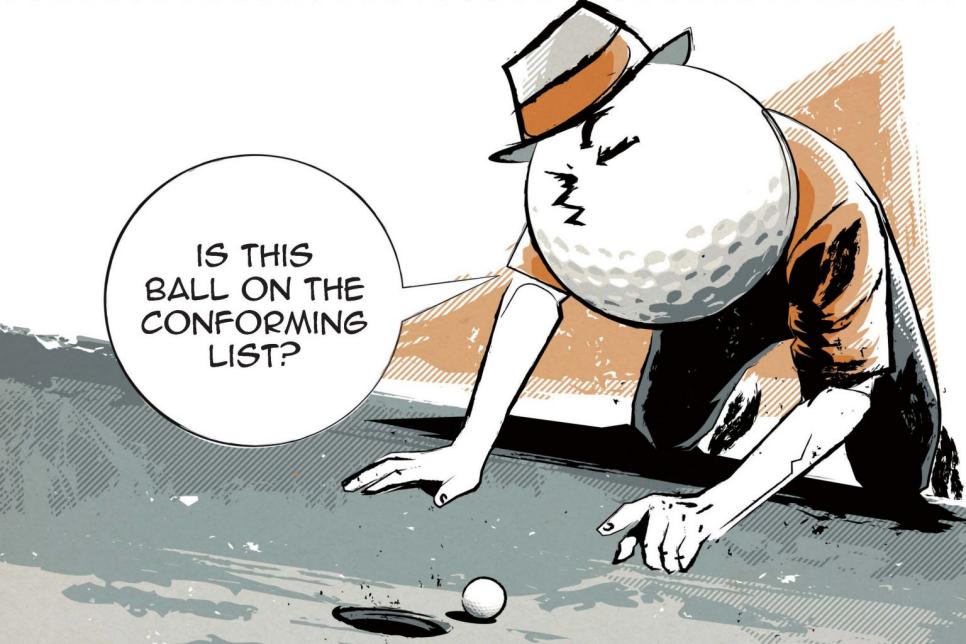
During a club championship final at a private club outside Chicago, the match was about to end when the player on the losing side asked if his opponent’s ball was on the USGA Conforming List. The ball—a two-piece Surlyn-covered Wilson with a SpongeBob SquarePants logo that no one in a million years would use in a club championship but for the greatest of fathers honoring his young child’s love of a cartoon—was not. According to Wilson, the company viewed it as a novelty product that would never be used in competition. The opponent insisted on the DQ and was awarded the win, about as empty a club-championship victory as is possible. Although the DQ’d player was upset at Wilson for not listing the ball (which Wilson did thereafter), everyone who sees the paint on the board is reminded who the real loser was.
Allowing A Penalty
In the semifinals of a prestigious four-ball tournament with a national field, three guys were in for par. As the fourth player lined up his 10-foot birdie putt, one of the opponents stood unusually close. The ball had barely left the putterface when the opponent sneered, “You forgot to move your coin back.” The putt went in.
Killing The Mood
We all find satisfaction in playing well, but what about satisfaction from others not playing well? Such a man is someone who I refuse to play golf with anymore because when he plays poorly—which is often for someone who is supposedly a 5-handicap—he kills the mood. He blames every mis-hit or mistake as a personal affront sent down by metaphysical forces. A natural raconteur, he becomes quiet and gives short responses after a few bogeys or a bad hole. No matter the venue, he will rip the course if his score is not to his liking. In our last round three years ago, he dubiously claimed “leaf rule” twice and complained that his caddie was giving him bad reads. Over beers after the round, he reconciled his bad day by proclaiming, “At least none of us played well.” Everyone but him had broken 75.
Stressing Your Group
I’ve got two dear golf friends who always find themselves having to sprint like Usain Bolt to the first tee. It’s embarrassing. They are 30 years apart in age, so this isn’t a generational thing. Yes, things happen that have caused us all to make mad scrambles to the course, and, yes, these two almost always wind up making it “on time,” but it still puts the group in a tough spot. It’s rude to continually do that. There are enough first-tee jitters to deal with besides worrying if your fourth is going to even hit a ball off No. 1. You get a dirty look from the starter. You wind up going back into the shop to pay for the person and get another dirty look in there. All the while your stress level rises when you should be having fun with your buddies. “On time” for golf means arriving at the course at least 10 to 15 minutes before your tee time, not 10 to 15 seconds.
Walking Off Early
We get it. When you’re playing bad, the parking lot never seems far. At the muny near the former Golf Digest editorial offices, the routing crossed the parking lot after the sixth and 13th holes, and it was there that many staffers relegated their reputations with excuses like, “I did something to my wrist on that root back there; I’d better go get an X-ray,” or “Apparently our houseguests have arrived earlier than expected,” or even the honest, “This is too slow for me.” If you start a round, finish it. In competition, one person cutting out is a disruption that can affect the rest of the group. In casual golf, dull as your company likely is, you leaving ruins any four-ball match and makes the foursome ahead feel even slower.
DAHMEN’S TAKE

As you would expect, the caddies on tour are professionals who are good at their job. On Thursday and Friday, they do all the little things right: where to stand, when to move, holding the flagstick so it doesn’t make a peep in the wind, and so forth. But then on the weekend, when you’re in a twosome with their guy, and it’s effectively a match because you’re battling over the same mid-place money, the caddie magically appears just in your periphery as you’re over a shot. The ultimate d!#k move is the water bottle time bomb. A cagey caddie will squeeze a mostly empty plastic bottle, stuff it in the bag, and then wait. The air expands until the bottle regains shape with a gentle, but certainly audible, “tick,” usually right in the middle of my downswing. It’s so subtle that you can’t call anyone out for it and look like a princess, but, man, this move drives me bonkers.




